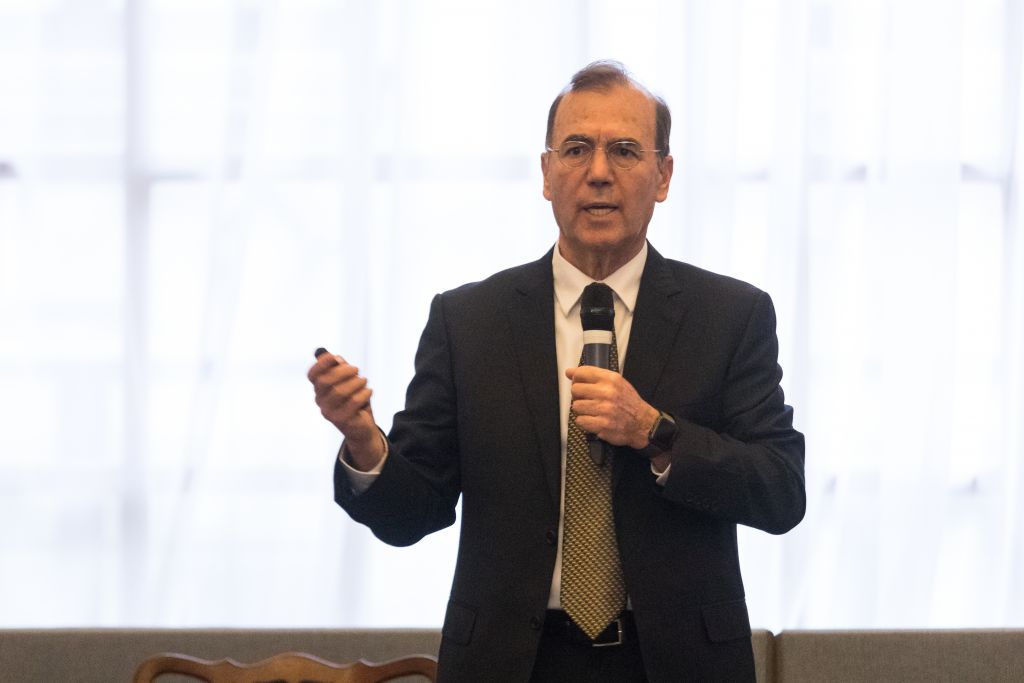Meet the top Israeli scientist who thinks ‘innovation can bring peace’
Stephen Oryszczuk meets Israel’s chief scientist Dr Ami Appelbaum in London, who reveals his country’s next high-tech steps
In the ornate setting of London’s Mansion House, a gently spoken Israeli tells me about unicorns. He is Israel’s chief scientist, and the ‘unicorns’ are Israeli start-ups now worth more than $1billion. He’s talking about how he wants to “turn the page” on Israel as the start-up nation, as we’ve all known it.
“It’s now about innovation and growth, differentiating technology, innovating faster than ever, growing large companies and a strong economy with very high value creation.” Buzz-words, but to the London investors he’s just been addressing as a guest of Israel Bonds, these are a lover’s whispered sweet nothings, with the same salivating effect.
The whisperer is Dr Ami Appelbaum, who is only four months in the role, after two decades in the private sector. “I worked for a semiconductor company,” he says, musing on Israel’s future investment. “There, if you ask the boss to invest, he asks what he’s going to get back. That’s what Israel should be doing – asking about the return, making sure all those innovations are leveraged to create a strong economy.”
Get The Jewish News Daily Edition by email and never miss our top stories Free Sign Up
Apart from the likes of Teva and Checkpoint, very few Israeli firms are big enough to compete on the world stage, I suggest. Instead, big Western fish swim to Israel, open branches and tap Israeli minds, the profits flowing back to HQ. Is that a worry? He shrugs an Israeli shrug.
“It’s always nice to say we have Israeli unicorns,” he says, “but global companies are a must in today’s world. Intel bought Mobileye for $15billion but kept the innovation in Israel, creates jobs and keeps us connected to the world. Today, borders are coming down. To grow a business you cannot rely on Israel, you need a much larger market, and for that we need to collaborate.

“So yes, as much as I want the companies to be Israeli, I encourage and promote big companies to come to Israel, for research and development, manufacturing, whatever. The purpose of the Israeli government is to create an ecosystem to attract investors.”
He says that to crank it up to the next level, Israel needs to “expand the volume of start-ups to establish a full ecosystem or industry.” In other words, don’t just have the odd nimble fish that gets gobbled up, but establish a self-sustaining shoal to attract life and bring in wealth.
Money is indeed inbound, he says, and not just from the US, but increasingly from Asia, including Japan, China, Taiwan and Korea, which are also some of the biggest markets. But market is only half of it. I ask about collaborations, and on whom Israel’s gaze has fallen. “Where do I think is most important? Wherever there is talent. If we can collaborate with talent, we will.”
His Israel Innovation Authority has signed 65 bilateral research agreements all over the world, he says, most recently in Uruguay. “We know to respect and appreciate talent. You find it in places like Argentina, China, India, in Eastern Europe, with its great education. This is where you get the input for great innovation. Then you find the funds for that innovation to grow. There are large investors in places like Mexico, China, India and the UK.”

A waiter serves us tea, which reminds me to ask about cultural differences.
“In Israel, if you want to motivate somebody, you raise a flag and say ‘it’s good for the country,’ Zionism. Every Israeli will jump. Then, you say it’s good for the company, it will grow, meaning more investment to the country. Third and last, Israelis ask ‘what’s in it for me?’ Now think about someone in the US. It’s the reverse.”
How does that translate on a personal level? He smiles. “My boss once asked me why Israelis told him to get lost, then later said ‘here, we made it, and it’s the best in the world.’ He was confused. I had to explain the Jewish culture is always to ask questions. When you study the Talmud, it’s all about questions, even in the Mishnah, asking ‘if’. You want to understand. So the Israeli culture is to challenge, to see why it’s good.”
He continues: “If you ask an Israeli to jump, he’ll never ask ‘how high?’ he’ll always ask ‘why?’ Even in the military, the commander goes out of their way to explain the reason for the mission, why we need to do it, how it fits into the big picture. They motivate their people before they ask them to do stuff. So I told my boss, ‘never order an Israeli to just do it. Go all out to explain why, how it will help. If you persuade them, they will go all the way for you.”
It seems to be working – with some world-beating Israeli technology. “Of course,” he says. “In this friendly neighbourhood of ours, we’ve had to be the best, for survival. You’re talking about the second or third generation after the Holocaust. If we’re not, we won’t be here.”
Where does he see technology helping Israel most in the next five or ten years? “Artificial Intelligence,” he says. “It’s critical, the ability to let the machine think, to make conclusions, but to make sure the human being will control it so the machine will not start to shoot by itself.”
In this “friendly” neighbourhood, does he see any opportunities for innovation to break down barriers? He comes alive. “Since the Arab Spring, the region is in major disarray. Even though they’re Israel’s enemies, it breaks every Israeli heart to see the suffering, bombing, the shortage of water, poor farming and medical treatment. Israel has solutions for it all. I strongly believe that at the end, relations between countries will depend on the shared interests of the people. Leaders only take you to so far – people’s interest, economic interest, will win. You see it throughout history; enemies become friends and collaborate in a common interest. I believe peace in the Middle East will come around innovation and prosperity, to take down animosity between peoples, because all have the same interests: to have a better life.”
Amen.

Thank you for helping to make Jewish News the leading source of news and opinion for the UK Jewish community. Today we're asking for your invaluable help to continue putting our community first in everything we do.
For as little as £5 a month you can help sustain the vital work we do in celebrating and standing up for Jewish life in Britain.
Jewish News holds our community together and keeps us connected. Like a synagogue, it’s where people turn to feel part of something bigger. It also proudly shows the rest of Britain the vibrancy and rich culture of modern Jewish life.
You can make a quick and easy one-off or monthly contribution of £5, £10, £20 or any other sum you’re comfortable with.
100% of your donation will help us continue celebrating our community, in all its dynamic diversity...
Engaging
Being a community platform means so much more than producing a newspaper and website. One of our proudest roles is media partnering with our invaluable charities to amplify the outstanding work they do to help us all.
Celebrating
There’s no shortage of oys in the world but Jewish News takes every opportunity to celebrate the joys too, through projects like Night of Heroes, 40 Under 40 and other compelling countdowns that make the community kvell with pride.
Pioneering
In the first collaboration between media outlets from different faiths, Jewish News worked with British Muslim TV and Church Times to produce a list of young activists leading the way on interfaith understanding.
Campaigning
Royal Mail issued a stamp honouring Holocaust hero Sir Nicholas Winton after a Jewish News campaign attracted more than 100,000 backers. Jewish Newsalso produces special editions of the paper highlighting pressing issues including mental health and Holocaust remembrance.
Easy access
In an age when news is readily accessible, Jewish News provides high-quality content free online and offline, removing any financial barriers to connecting people.
Voice of our community to wider society
The Jewish News team regularly appears on TV, radio and on the pages of the national press to comment on stories about the Jewish community. Easy access to the paper on the streets of London also means Jewish News provides an invaluable window into the community for the country at large.
We hope you agree all this is worth preserving.
-
By Brigit Grant
-
By Laurent Vaughan - Senior Associate (Bishop & Sewell Solicitors)
-
By Laurent Vaughan - Senior Associate (Bishop & Sewell Solicitors)
-
By Laurent Vaughan - Senior Associate (Bishop & Sewell Solicitors)
-
By Laurent Vaughan - Senior Associate (Bishop & Sewell Solicitors)






















